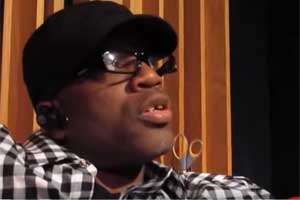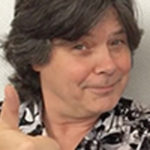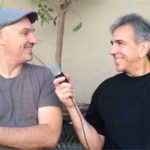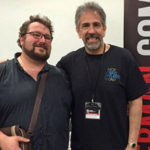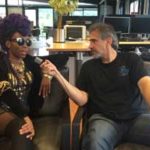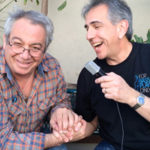Why this one-time “South Bronx prodigy,” now CEO of NuVybe Records, is compelled to produce music with a positive message
Exclusive interview with FBPO’s Jon Liebman
November 2, 2016
A native of the “South Bronx” in New York City, Herb Middleton is a world-renowned musician and record producer, with multiple Grammy nominations. Beginning his professional career in the Pilgrim Baptist Cathedral Choir in Brooklyn, “Big Herb,” as he became known, learned to play several instruments, including drums, keyboard and bass.
A quick study, Herb’s producing and songwriting skills soon caught the attention of several distinguished producers, engineers and songwriters, leading to an exemplary career in the music business. To date, Herb Middleton has collaborated with such notables as Loris Holland, Tony Prendatt, Teddy Riley, Sean “Puffy” Combs, Mary J. Blige, Al Green, Teddy Pendergrass and several others.
Herb is currently CEO of NuVybe Records, an independent record label and production company dedicated to “producing and recording live music, with a positive message.”
FBPO: Tell me about your musical upbringing.
HM: It was in school. Actually, my first school was my bedroom that I shared with my brother. He played all of the R&B classic music when I was a child. He’s older than me, so I got familiar with Black Ivory, Earth, Wind & Fire, Kool & the Gang, B.T. Express, Curtis Mayfield … you know, all of the older legends. I adapted a love for the music.
My brother was a drummer. My mother bought me a drum set, a little Mickey Mouse drum set, so I started playing the drums a little bit. My brother was playing in his high school band and he came home one day and said, “Herb, you know, you should play the bass.”
He took me to this concert with Kool & the Gang and Black Ivory and B.T. Express. I watched Kool from Kool & the Gang play the bass and that was all she wrote. I came home and I got in (front of) the mirror. I got a broom and I started acting like I was playing the bass in the mirror [laughs]. My parents noticed that I was doing it and they bought me a little cheap Sekova bass, you know, it must have cost $87, and I learned how to play it. After about six months, I was good enough to play in a band.
FBPO: Who were your other heroes on the bass once you discovered the instrument and started playing it?
HM: The first hero was Larry Graham. I kind of gravitated toward his slap technique. And then after that, Stanley Clarke. School Days, the album cover. I used to stare at it.
FBPO: Tell me about your collaboration with Loris Holland.
HM: Loris Holland was mentoring me. I was his protégé. We played at the same church in Brooklyn, where he was the MD. He was doing some work outside the church. He was producing people like Vanessa Armstrong, Jonathan Butler, and I guess he saw something in me. He took my under his wing, showed me a little songwriting skills and connected me to a person who had some equipment he wasn’t using and I learned how to program my own music. It went from one thing to the next.
FBPO: Teddy Riley is another name that stands out in your bio. Tell me about your experience with him.
HM: I was working in a studio and I shared a room with a guy named Tony Prendatt. He was an engineer and he had a room in a studio in Manhattan, a soundtrack studio. I met a young lady who was working with Teddy Riley at the time and she sent some of my music to Teddy. The next thing I knew, I got home from work one day and my mother said, “Herb, Teddy Riley just called,” and my heart like literally stopped for a second [laughs]. Man, it was the most exciting phone call I had ever received! And he told me he wanted me to be one of his producers. He actually sent for me and I went down to Virginia Beach, where he had Future Records. Out of the deal, I got a song placed on a Bobby Brown (record) as a co-writer.
FBPO: Tell me about NuVybe Records.
HM: NuVybe Records is my independent production company. My wife started the label and I’ve been developing independent artists since she founded the company, staying more on the positive vibe of music because that’s the music that I grew up loving. Although I’ve been – and still am – a hip-hop producer, I think right now this generation of music has gone a little bit too far for me to really enjoy producing. So I’ve been sticking to producing and developing more positive talent.
FBPO: Let’s talk a little bit about the bass-playing side of your career. What kind of equipment are you using as a bass player?
HM: I have a Fender Jazz bass. I had a five-string years ago and I sold it. The Jazz bass is one that I’ve had for a while. I promised myself I would never get rid of it because when I first got the bass I was working with Mary J. Blige. I actually did my first bass session for a live orchestra session with that bass. I played other sessions when I was younger, but this one was the biggest (one) for me, so I made a promise I would never get rid of that bass.
FBPO: Tell me about Black Diamond Strings.
HM: Black Diamond Strings. I just got an endorsement with them. I love the strings! I’ve been using them for a while now, so to get an endorsement with them was really exciting. I like their brightness. I’m a real “dirty” type of bass player and I like the sound the strings give on certain frequencies. And I love the fact that I don’t have to change my strings that often with Black Diamond! Not that I have a problem with it, but they last a long time.
FBPO: What’s keeping you busy these days?
HM: I’m still building the company, NuVybe, working on a lot of hip-hop music that will be refreshing to the world once it gets out. And just a lot of original stuff. I have my own website where I sell my music directly to the people that follow me. I’m enjoying the freedom to be flexible.
The first band I played in, Jon, was a Latin band, outside of my public school, so that’s been a real, real serious push in my style of playing. I love Brazilian jazz, anything that has to do with Latin. Actually you can hear a lot of Latin flavor in my productions because I use a lot of Latin progressions and beats and rhythms.
FBPO: What about the future? What else would you like to do that you haven’t already accomplished?
HM: I would like to have a school, a production school for younger kids who want to learn how to produce. I would have to build my own curriculum because I have a very different style of producing music that I think is pretty original, but I wouldn’t mind passing along some of the techniques I use. I’m really about empowering youth right now. That’s my passion, as a father and a grandfather. There are a lot of children out here, Jon, that don’t have somebody to nurture them in the craft of music – and life in general. Just some little tidbits for these kids because it’s kind of out-of-hand with the younger generation, you know what I’m saying?
FBPO: What would you be if you weren’t a bass player?
HM: I would probably be a social worker or a mentor. Anything that’s going to help uplift people.
